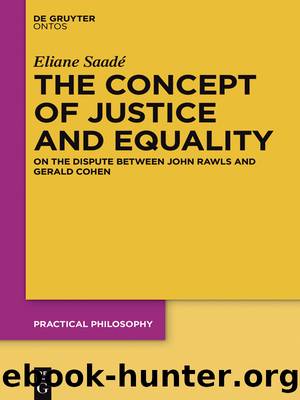The Concept of Justice and Equality by Eliane Saadé

Author:Eliane Saadé
Language: eng
Format: epub
Publisher: Walter de Gruyter
Published: 2015-02-15T00:00:00+00:00
5.6 Rescue of Equality from the Contradiction of the Difference Principle
Let one assume that the talented persons are truly unable - due to an insurmountable inability - to increase their production without receiving unequalizing incentives, âthen there would be no consequent stain of injustice on the resultant societyâ (RJE: 153). But, even if inequalities were needed72 to augment productivity, they would remain unjust, because they result in one way or the other from morally arbitrary contingencies. Therefore, âthe impossibility of justice, whether or not it is due to a flaw in human nature, is insufficient for the justice of the possibleâ (RJE: 155).
On the one hand, Cohen argues that the moral arbitrariness of social and economic inequalities and thereby their injustice contradicts the content of the difference principle, which endorses the justice of these inequalities. He explains furthermore that there are two versions of the difference principle which express different rationales. Whereas on the canonical view, âthere is nothing especially privileged about equalityâ (RJE: 157), acting within the non-canonical difference principle implies ânot wanting to have greater advantages unless this is to the benefit of others who are less well offâ (ibid.). On the other hand, the inequality that the canonical difference principle tolerates does not compensate for undeserved and thereby unjust morally arbitrary contingencies. This inequality increases the social and economic differences among the social classes.
The unfairness of arbitrarily caused inequality is the starting point of a chain of reasoning that ends in affirmation of the [canonical] difference principle, but that principle shows no trace of commitment to fairness that justifies that starting point (RJE: 158).
Thus differences in talent do not justify social and economic inequalities and that is why, Cohen argues, Rawls starts with equality and then justifies inequality (within the Pareto argument), which is based on morally arbitrary causes. Therefore, âfairness fanatics will then eliminate the inequality, and sensible folk, like me, will tolerate it, while judging it to be unfairâ (RJE: 168). Cohen highlights another contradiction between the Pareto argument and the moral arbitrariness that the difference principle embodies.
The reason we begin with equality is the moral arbitrariness of the standard causes of inequality. We are then told that, if everyone can be made better off, there is no reason to stay with equality. But there is a (nonconclusive) reason to stay with it, to wit, the reason we had to begin with it (ibid.).
Download
This site does not store any files on its server. We only index and link to content provided by other sites. Please contact the content providers to delete copyright contents if any and email us, we'll remove relevant links or contents immediately.
Machine Learning at Scale with H2O by Gregory Keys | David Whiting(4292)
Killers of the Flower Moon by David Grann(4037)
Oathbringer (The Stormlight Archive, Book 3) by Brandon Sanderson(3154)
Will by Will Smith(2907)
Once Upon a Broken Heart by Stephanie Garber(2844)
Guns, Germs and Steel by Diamond Jared(2365)
It Starts With Us (It Ends with Us #2) by Colleen Hoover(2340)
Borders by unknow(2301)
Friends, Lovers, and the Big Terrible Thing by Matthew Perry(2219)
The Room Where It Happened by John Bolton;(2150)
The Color of Law by Richard Rothstein(1935)
A Short History of War by Jeremy Black(1842)
The Strength In Our Scars by Bianca Sparacino(1840)
HBR's 10 Must Reads 2022 by Harvard Business Review(1839)
A Game of Thrones (The Illustrated Edition) by George R. R. Martin(1721)
Water Rights and the Environment in the United States by John Burch(1673)
515945210 by Unknown(1660)
Examples & Explanations: Administrative Law by William F. Funk & Richard H. Seamon(1641)
That Every Man Be Armed by Stephen P. Halbrook(1577)
